Key takeaways:
- Education choices extend beyond traditional colleges; vocational programs, online courses, and apprenticeships can lead to fulfilling careers aligned with personal passions.
- Evaluating educational paths requires considering factors like passion alignment, skill development, job market trends, cost, and flexibility for a tailored fit.
- Traditional education models can stifle creativity and adaptability, often favoring standardized assessments over personalized, collaborative learning experiences.
- Personal interests, socioeconomic factors, and societal expectations significantly influence educational decisions, highlighting the importance of pursuing paths that resonate with one’s true aspirations.
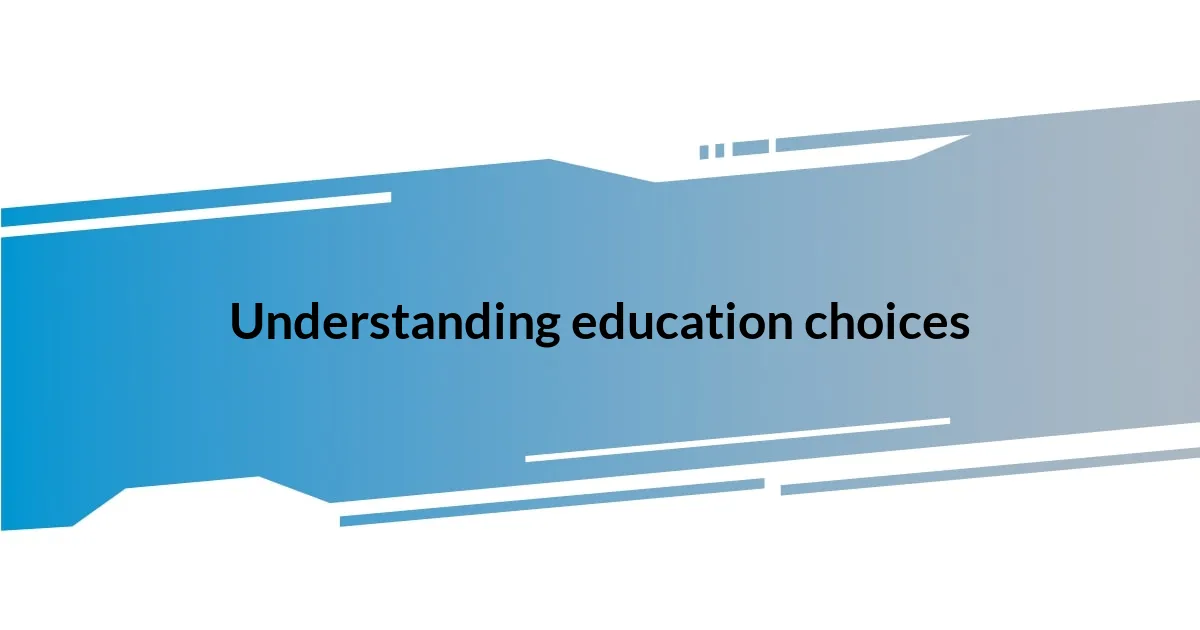
Understanding education choices
Understanding education choices can be overwhelming, especially when considering the variety of paths we can take. I remember standing at a crossroads during my final year of high school, feeling the weight of expectations—both my own and those of my parents. Did I really want to pursue a traditional college route, or was there something more aligned with my passion?
As I navigated through the options, I learned that education doesn’t only mean attending a university. Finding a vocational program or even an online course can lead to fulfilling careers. I often wonder how many people overlook these alternatives because they feel pressured to follow conventional tracks. It’s a shame when passion is set aside for the “expected” path.
Every choice carries its own set of rewards and challenges, and reflecting on these can illuminate what truly matters to us. I recall a friend who chose an unconventional route, diving into digital marketing instead of going to a four-year college. She not only thrived in her career but also discovered a love for storytelling, which echoed her childhood dreams. That made me realize how vital it is to choose an education path aligned not just with societal norms but with our deeper aspirations and interests.
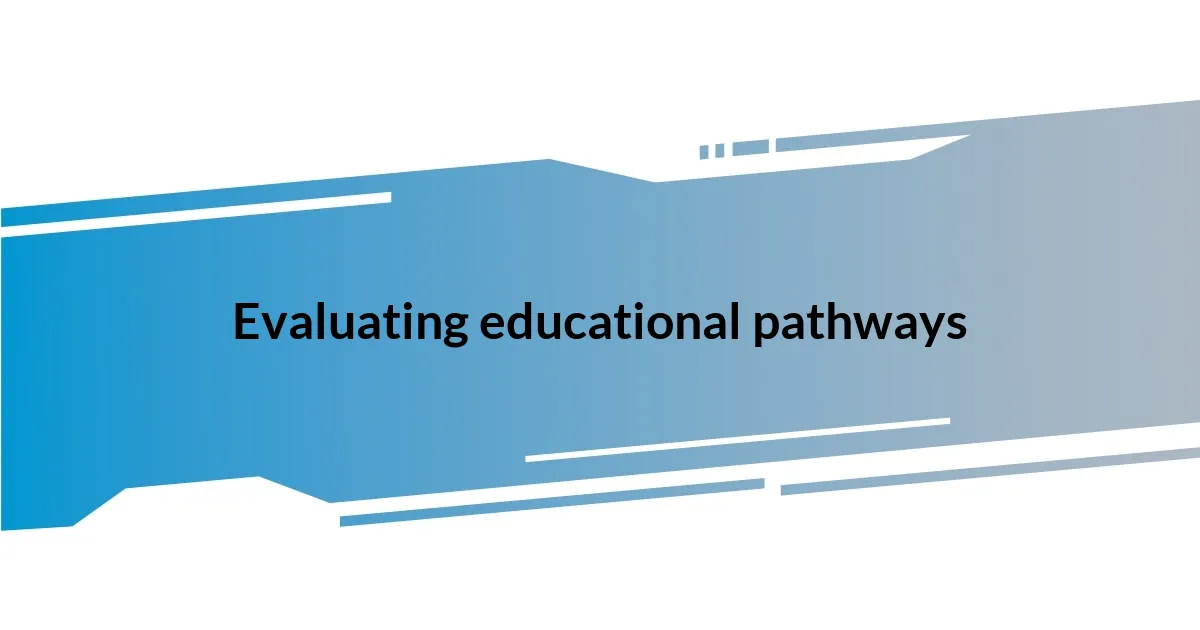
Evaluating educational pathways
Evaluating educational pathways has been an essential part of my journey. I distinctly remember the moment I stumbled upon a discussion about apprenticeships during a casual coffee chat with a mentor. It was a lightbulb moment for me; the idea that practical experience could be just as valuable—if not more so—than a degree opened my eyes. This revelation forced me to reassess what I viewed as success in education and career.
When considering different educational avenues, it’s crucial to weigh several factors:
– Passion Alignment: Does this pathway resonate with what I truly enjoy?
– Skill Development: Will I be gaining practical skills that are in demand?
– Job Market Trends: What industries are growing, and what qualifications do they require?
– Cost vs. Benefit: Am I making a sound financial decision for my future?
– Flexibility: Does this option allow me to balance work, study, and life?
By carefully evaluating these facets, I found a more tailored fit for my journey, one that ignited my enthusiasm rather than just following a prescribed path.
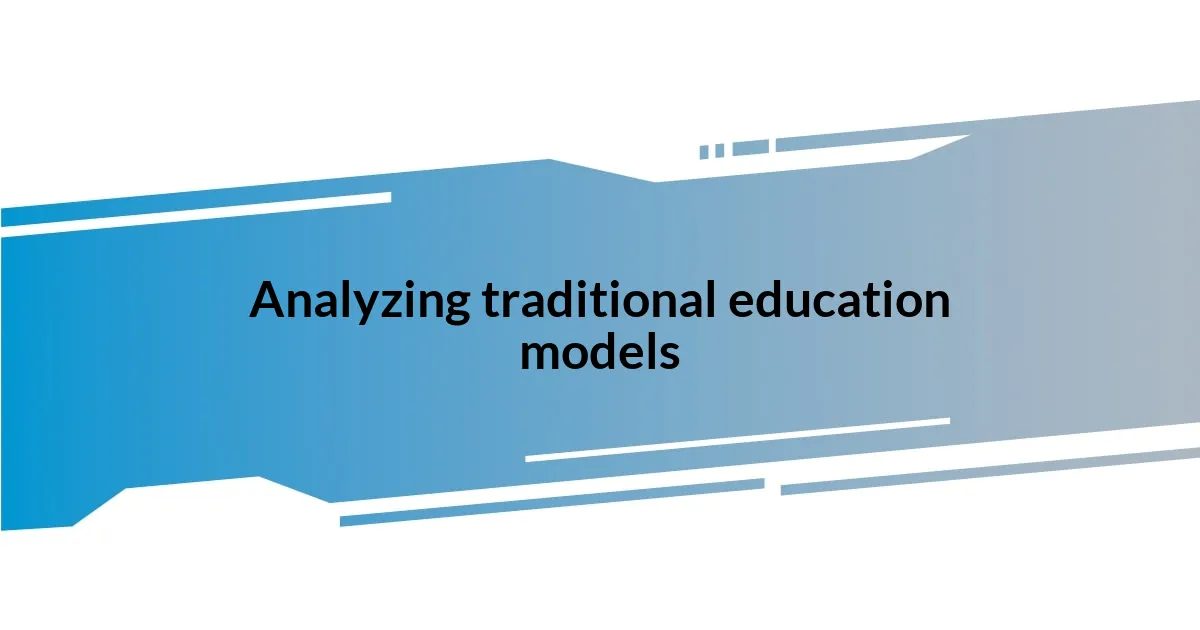
Analyzing traditional education models
Analyzing traditional education models reveals a system deeply rooted in history. It emphasizes standardized curricula and classroom settings, providing uniformity. While this structure has its benefits, like fostering discipline, I can’t help but ponder if it’s stifling creativity. I remember sitting in long lectures, feeling my mind wander, wishing for a more interactive approach. It makes me wonder: How many brilliant ideas go unnoticed in such a rigid framework?
Moreover, traditional models often rely heavily on assessments, creating a competitive environment that can overwhelm students. I witnessed classmates thrice as anxious about tests as they were excited about learning. This culture can lead to short-term memorization rather than genuine understanding. Reflecting on my own experiences, I realized that my most meaningful learning happened in moments of collaboration, rather than isolated exam cramming. The disparity between grades and actual knowledge often troubled me.
Ultimately, while traditional education has shaped many of us, it has its flaws, particularly regarding adaptability. Not everyone thrives under conventional teaching methods. One of my closest friends struggled with this very format, finally thriving only after switching to a personalized approach. I often think about how a more flexible system could potentially unlock the potential within every learner.
| Aspect | Traditional Education Model |
|---|---|
| Structure | Standardized curricula and schedules |
| Assessment | Emphasis on exams and grades |
| Learning Style | Primarily teacher-centered |
| Adaptability | Limited adjustments for individual needs |
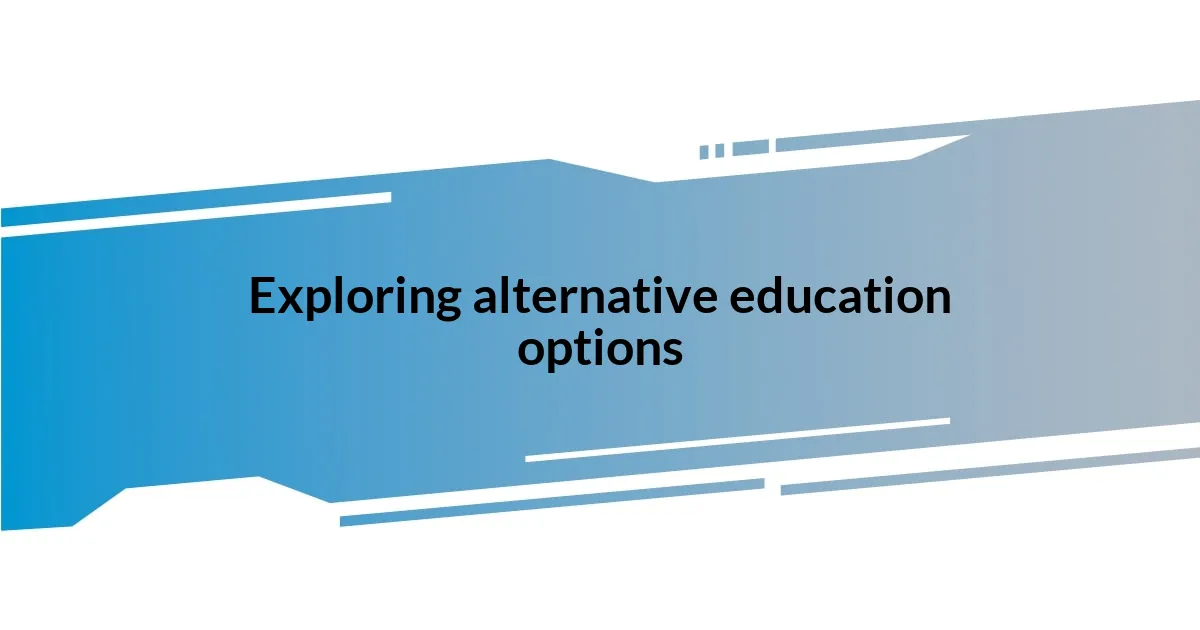
Exploring alternative education options
Exploring alternative education options has opened my eyes to a world beyond the traditional classroom setting. A few years ago, I ventured into online courses, hoping to learn graphic design. I’ll never forget the thrill I felt when I completed my first project—something I created entirely on my own terms. It made me realize that learning can happen anywhere, and sometimes, the freedom to learn at your own pace can ignite a passion that a standard curriculum might overlook.
I’ve also been intrigued by the rise of homeschooling. I often ask myself how that kind of personalized education might change a child’s experience. A friend of mine chose this path for her children, focusing on their interests and strengths. Once, she shared how much her kids loved exploring marine biology topics through local beach expeditions. It struck me that alternative choices can foster incredible curiosity that traditional settings may not always cultivate.
Moreover, I’ve delved into mentorship programs and apprenticeships, and each experience brought its own lessons. I remember shadowing a professional in a field I admired. The hands-on experience—not just the theory—made a profound impact on my understanding. It’s moments like these that make me question: What if more students had access to such dynamic learning opportunities? I’ve come to appreciate that there’s not just one path to success, and every system has the potential to shape a unique and fulfilling educational journey.
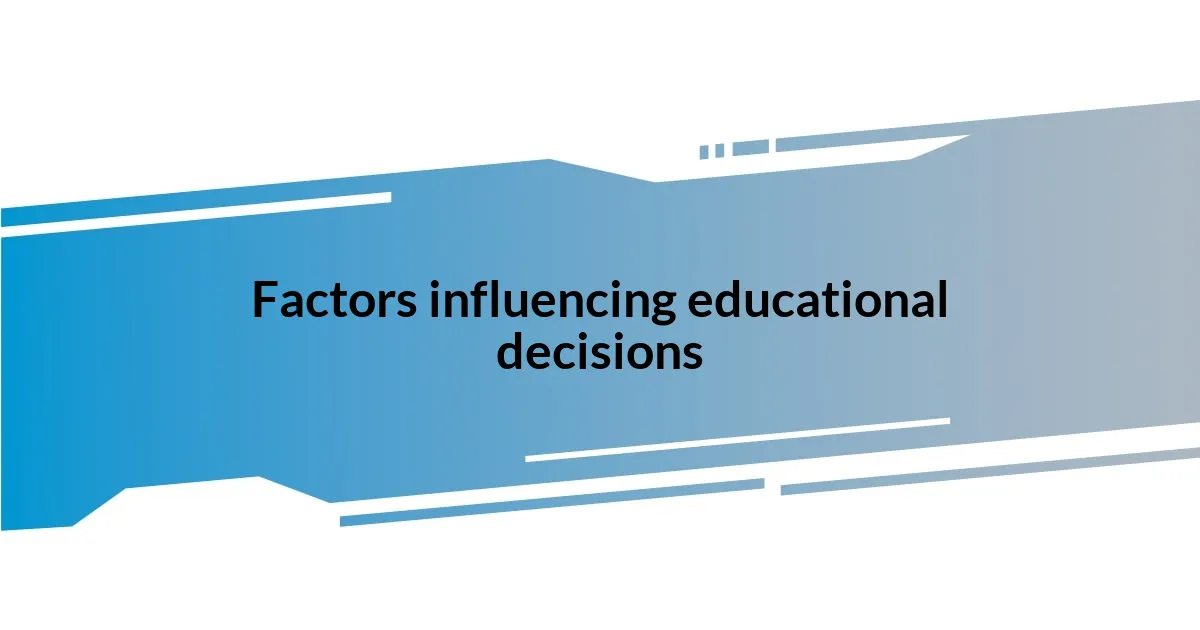
Factors influencing educational decisions
When it comes to educational decisions, personal interests often play a crucial role. I recall a pivotal moment during my high school years when I had to choose between pursuing science or literature. While my parents encouraged a path in engineering for stability, my heart yearned for creativity. This internal conflict made me realize that choosing an educational path aligned with one’s passion can lead to more fulfilling experiences, not just in academics but in life overall.
Socioeconomic factors can’t be overlooked either; they often shape opportunities available to students. I remember a classmate whose family faced financial constraints, limiting her choices to public institutions despite her exceptional talent in the arts. I’ve seen how this disparity can deter bright students from pursuing their true calling. It makes me wonder just how many brilliant minds are kept at bay simply because of their financial backgrounds. Access to resources can significantly influence educational choices, directly impacting future prospects.
Additionally, cultural and societal expectations can weigh heavily on decisions. In my community, there was a prevailing belief that only certain professions were worthy, like medicine or law. I felt pressured to fit a mold that didn’t resonate with me. It wasn’t until I sought guidance from mentors outside my immediate circle that I realized there’s a breadth of options. This experience taught me that education should not merely reflect external expectations, but should also encourage individuals to carve their unique paths based on their true aspirations.
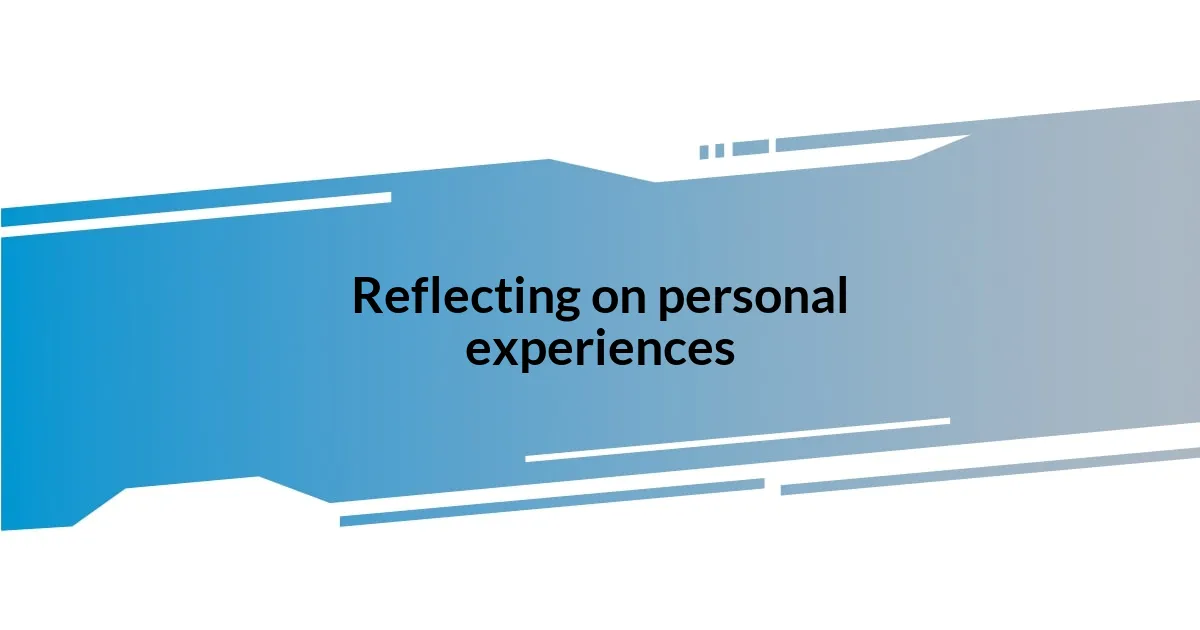
Reflecting on personal experiences
Reflecting on my personal experiences in education, I can’t help but think back to my early days in college. I remember walking into that lecture hall for the first time, feeling a mix of excitement and fear. It was overwhelming, and I questioned whether I belonged among such bright minds. Yet, that very feeling of uncertainty propelled me to seek out study groups, where I found not just support but lasting friendships. What if I hadn’t taken that leap? It’s interesting to ponder how small choices can shape our narratives.
A particularly eye-opening moment happened during my volunteer tutoring stint at a local community center. A young girl struggled with math, frustrated and convinced she would never understand it. I remember her face lighting up when I connected the subject to her love for video games. Experiencing her transformation made me realize the power of personalized learning. Could it be that the best lessons often come from making connections that resonate with individual interests?
As I look back, I recognize the profound impact of setbacks as part of my educational journey. In high school, after failing an important exam, I felt devastated, convinced I had failed myself and my dreams. But that failure pushed me to reevaluate my study habits and seek help from my teachers. What originally felt like a setback turned into a stepping stone, emphasizing that growth often arises from our hardest moments. Have you experienced anything similar? It’s a reminder that our individual paths are rarely linear, and the lessons we learn often shape us more than any textbook ever could.
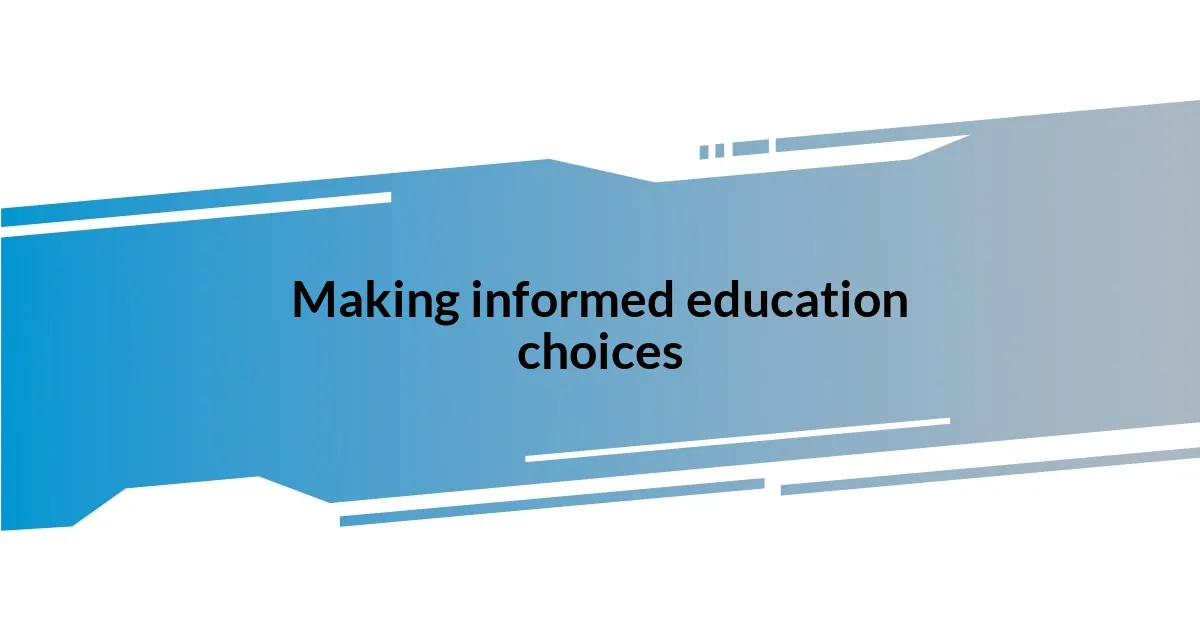
Making informed education choices
Making informed education choices isn’t just about picking a field of study; it’s about understanding oneself. I remember sitting in a career counseling session where the consultant asked me what I enjoyed most. Instead of listing courses, I found myself sharing stories about my summer job as a camp counselor. It struck me then how much I valued mentoring, which ultimately guided my decision to pursue education as a career. Don’t you think that reflecting on our interests can reveal paths we hadn’t considered before?
Another pivotal realization came when I researched various educational institutions. While browsing for schools that offered innovative teaching methods, I stumbled upon a small, progressive college that focused on experiential learning. I can still recall the thrill of envisioning how that hands-on approach could ignite my passion for learning. It made me appreciate how critical it is to dig deeper than rankings and reputations; sometimes, the right fit isn’t what everyone else deems best.
Finally, when weighing options, I learned the importance of seeking advice from both mentors and peers. I once had dinner with a professor who shared his nontraditional career trajectory. His story reminded me that education is a journey filled with twists and turns, often leading us to unexpected places. So, could our conversations with those who have walked similar roads offer us clarity? I believe they can shine a light on paths we might not have otherwise considered, transforming confusion into guidance.